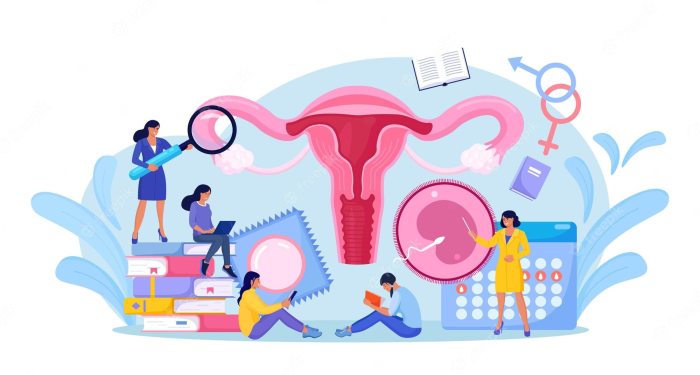
Embark on a journey exploring the vital connection between reproductive health and nutrition, uncovering the impact of diet on overall well-being.
Discover the key nutrients and tips for maintaining a balanced diet to support optimal reproductive health.
Reproductive Health and Nutrition
Proper nutrition plays a crucial role in supporting reproductive health. The food we consume provides essential nutrients that are necessary for the proper functioning of reproductive organs and processes.
The Importance of Nutrition for Reproductive Health
Nutrition directly impacts fertility, pregnancy outcomes, and overall reproductive health. Adequate intake of key nutrients ensures the body has the necessary building blocks for hormone production, egg and sperm development, and a healthy pregnancy.
- Protein: Essential for hormone production and the growth and repair of reproductive tissues.
- Folic Acid: Crucial for preventing neural tube defects in the developing fetus.
- Iron: Important for oxygen transport in the blood, especially during pregnancy.
- Omega-3 Fatty Acids: Support hormone regulation and may improve fertility.
Tips for Maintaining a Balanced Diet for Reproductive Health
A balanced diet rich in fruits, vegetables, whole grains, lean proteins, and healthy fats is key to supporting reproductive health. Avoid processed foods high in sugar and unhealthy fats, as they can negatively impact hormone balance and fertility. Stay hydrated, limit caffeine intake, and consider taking a prenatal supplement if planning for pregnancy.
Contraceptives Birth Control Reproductive Health

Contraceptives play a crucial role in promoting reproductive health by allowing individuals to make informed choices about their sexual and reproductive needs. By preventing unintended pregnancies, contraceptives help in family planning and overall well-being.
Types of Contraceptives
- Birth Control Pills: Oral contraceptives that contain hormones to prevent ovulation.
- Condoms: Barrier method that prevents sperm from reaching the egg.
- IUDs: Intrauterine devices inserted into the uterus to prevent pregnancy.
- Implants: Small devices placed under the skin that release hormones to prevent pregnancy.
Role of Contraceptives in Reproductive Health
- Preventing Unintended Pregnancies: Contraceptives help individuals plan and space pregnancies, leading to healthier outcomes for both mother and child.
- Managing Menstrual Irregularities: Some contraceptives can regulate menstrual cycles and reduce symptoms of conditions like polycystic ovary syndrome.
- Reducing the Risk of Sexually Transmitted Infections: Condoms not only prevent pregnancy but also protect against STIs.
Benefits and Side Effects of Contraceptive Methods
- Benefits:
- Improved reproductive health
- Increased control over family planning
- Reduced risk of unintended pregnancies
- Side Effects:
- Nausea
- Headaches
- Weight changes
How Contraceptives Work
Contraceptives work by either preventing ovulation, inhibiting sperm from reaching the egg, or altering the uterine lining to prevent implantation. It is essential to choose the right method based on individual needs and health considerations.
Final Wrap-Up

In conclusion, prioritizing nutrition in reproductive health is a cornerstone for a healthy lifestyle, empowering individuals to make informed choices for their well-being.
Questions and Answers
How does nutrition impact reproductive health?
Nutrition plays a crucial role in supporting reproductive health by providing essential nutrients for optimal functioning.
What are the benefits of contraceptives for reproductive health?
Contraceptives help in preventing unwanted pregnancies and can also regulate menstrual cycles, promoting overall reproductive well-being.





